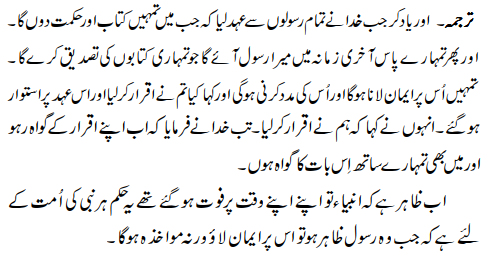He affirmed in Haqiqat-ul-Wahy
that prophethood ended with Holy Prophet Muhammad
Haqiqat-ul-Wahy is one of the last books
of Hazrat Mirza Ghulam Ahmad, published in May 1907, one year before
his death. In this book he has made the affirmation no less than
four times that prophethood ended with the Holy Prophet Muhammad.
1. Belief in Allah includes belief that Holy Prophet came
at the end of all prophets
Discussing what it means to believe in Allah, Hazrat Mirza
Ghulam Ahmad writes:

“God the Most High has defined the name Allah in the Holy
Quran as follows. Allah is the Being Who is Rabb-ul-‘alamin,
Rahman and Rahim,Who created the earth and the heaven
in six days, and made Adam, and sent messengers and scriptures,
and at the end of all of them sent Muhammad, may peace
and the blessings of Allah be upon him, who is the Khatam
al-anbiya and the best of messengers.”
— Haqiqat-ul-Wahy, p. 141; in Ruhani
Khaza'in, vol. 22, p. 145.
Here he says that the very definition of the name Allah,
as given in the Quran, includes the fact that Allah sent the Holy
Prophet Muhammad as the last of all messengers.
2. Last Prophet to gather all nations under his banner
While referring to certain of his own prophecies, Hazrat Mirza
Ghulam Ahmad writes:

“This news was given only by that God Who sent our Holy Prophet,
may peace and the blessings of Allah be upon him, at the end
of all the prophets, in order to gather all the nations under
his banner.”
— Titma or Appendix to Haqiqat-ul-Wahy,
p. 44; in Ruhani Khaza'in, vol. 22, p. 477.
Not only does he say here plainly that Allah sent the Holy Prophet
Muhammad “at the end of all the prophets”, but
he gives a reason for it, namely, so that he could unite the followers
of all prophets under the banner of Islam.
3. The Kalima teaches that Holy Prophet Muhammad was the
Final Prophet
Regarding the most fundamental teaching given by every prophet,
Hazrat Mirza Ghulam Ahmad writes:

“If all the books of God the Most High are looked into closely,
it will be found that all prophets have been teaching:
believe God the Most High to be One without partner and along
with it also believe in our risalat (messengership). It
was for this reason that the summary of the teachings of
Islam was taught to the entire Umma in these two sentences:
La ilaha ill-Allah Muhammad Rasul-ullah (There is no god
but Allah, Muhammad is the Messenger of Allah).”
— Haqiqat-ul-Wahy, page 111;
in Ruhani Khaza’in, vol. 22, p. 114. (The words “all prophets” and “summary” are in bold in the original Urdu.)
According to this statement, no prophet can come after the Holy
Prophet Muhammad because any such prophet would have to teach people
that “There is only one God, and I am His messenger”,
but this he cannot do because the entire Muslim Umma,
for all time to come, has already been taught “There
is no god but Allah, Muhammad is the Messenger of Allah” as
the summary of Islam.
4. Followers of previous prophets (even now) required to believe
in Prophet Muhammad
Hazrat Mirza Ghulam Ahmad, after quoting verse 81 of chapter 3
of the Holy Quran, translates it into Urdu as follows:

“And remember when God took a covenant from all messengers
that when I will give you the book and the wisdom, then in the last
ages My messenger will come to you, confirming your books, you
must believe in him and aid him. He said: Do you affirm this compact
and adhere to it? They said: We do affirm. Then God said: Now be
witness to your compact and I too am a witness with you.”
He then adds the comment:
“Now it is clear that the prophets died, each in his own time.
So this command is for the Umma of every prophet,
that when that Messenger appears you must believe in him, otherwise
you will be accountable for it.”
— Haqiqat-ul-Wahy, pages 130–131;
in Ruhani Khaza’in, vol. 22, pages 133–134.
Hazrat Mirza Ghulam Ahmad has used the words all messengers
and the Umma of every prophet for the prophets and
messengers who appeared before the Holy Prophet Muhammad.
So all prophets and messengers who were ever to appear, other than
the Promised Messenger himself, had already come before him. That
Messenger, the Holy Prophet Muhammad, is also described by him as
coming “in the last ages”.
Moreover, the followers of those prophets (e.g. Jews and Christians)
were commanded to believe in “that Messenger”, i.e. the
Holy Prophet Muhammad, when he appeared. That obligation upon them
to believe in him has been in force since the beginning of Islam,
and into the future permanently. Therefore no prophet can come after
the Holy Prophet Muhammad because at any time, today also, the followers
of previous prophets are required only to believe in the Holy Prophet
Muhammad and not additionally in another prophet after him. |



